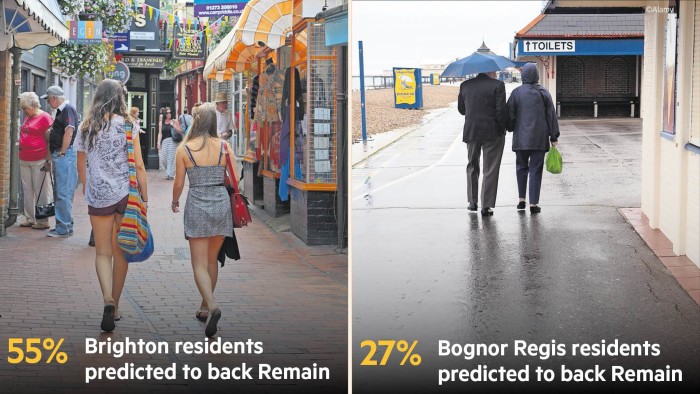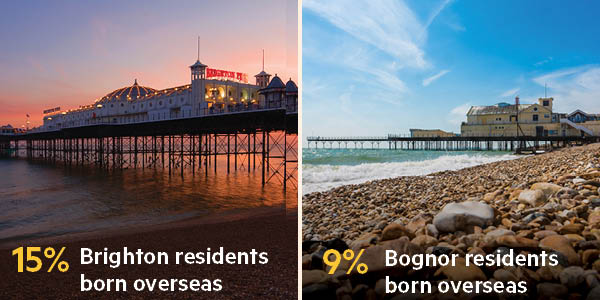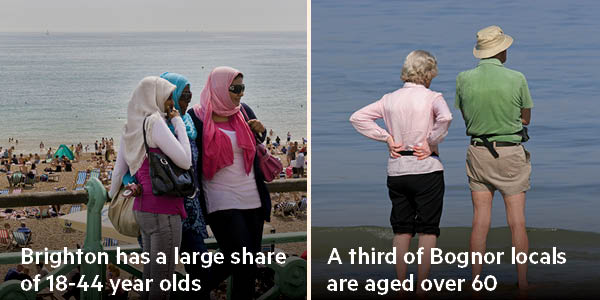Brighton rocks to Euro beat as Bognor dances to Brexit tune

The seaside towns of Brighton and Bognor Regis lie just 30 miles apart and both face out across the English Channel. Yet their attitudes towards the EU differ vastly.
Brighton has a young, professional population and is only an hour from London: its residents seem certain to vote overwhelmingly to stay in Europe.
Bognor’s citizens are more likely than average to be non-graduates and to be retired. Most are expected to vote to quit the EU.
The two conurbations are microcosms of the cultural divide playing out across the UK.
Age and educational attainment are the biggest clues for how people will vote in the June referendum, according to academics such as Chris Hanretty from the University of East Anglia.
Earlier this month 1,000 students turned up to an EU debate at Sussex University, based in Brighton.
When Caroline Lucas arrived loud cheers erupted. The pro-EU Green MP beat her opponent, Tory MP Jacob Rees-Mogg, by 76 per cent to 19 per cent in a poll of the audience.
Support for the bloc is fervent among the cafés and vintage-clothing shops of The Lanes, Brighton’s mazelike old fishing quarter.
Nicola Frisby, a music teacher, says without irony that the EU is “one big happy family”. Thea Morris, a gardener, says: “I feel European more than I feel English or Irish.”
Mr Hanretty’s research indicates that 55 per cent of people in Brighton Pavilion constituency will back “Remain” with only 24 per cent for “Out”.
Indeed, the UK Independence party has complained about receiving a “really unpleasant reception” in the leftwing city.
Helen Salgo, a 38-year-old web designer, says “with all my heart” that the UK should remain in the EU. “My worst nightmare is Britain leaving Europe and Trump in the White House,” says the Green voter.
Many Europeans in Brighton are bilingual and work in technology, media or service industries.
Jake Penny, a supervisor at the Dead Wax Social bar, says he will vote In: “Every job I’ve been in I’ve worked with English and foreign people — there’s no issue, no tensions. My boss now is Swedish; we get along great.”

Peter Kyle, Labour MP for Hove, says Brighton voters feel “connected” to the continent. “They have grown up in a global world; they feel global and think globally.”
Brighton has strong cultural and business links with London: 34,000 people commute there each day. Concerns about sky-high house prices echo those in the capital.
The city’s biggest employers tend to be in the service industries: American Express, Legal & General and Lloyds TSB.
About 37 per cent of locals are graduates, against a national figure of 27 per cent. It has an outsized population of 18- to 44-year-olds.
Mr Kyle’s biggest fear is that people will not bother to vote. “Many can’t see any logic behind Brexit so they think the rest of the country will think the same way.”
That is borne out by Ms Frisby’s boyfriend, Peter Hamilton, who will not vote. “I don’t know what difference it will make. I know that’s odd when I’m half Spanish.”
Ms Lucas, the Green MP, echoes those concerns: “Younger people are more likely to be pro-European and less likely to vote: I’m very worried on that front.”
She has urged a more passionate, visceral campaign instead of a “Gradgrind” bombardment of statistics.
Over in Bognor Regis, a sign welcomes visitors to “Britain’s sunshine capital”.
Modern blocks of flats line the west end of the beach. But further east, the pier has been damaged by fire and flood, and has been left to rot in the salt air.

Bognor’s demographic profile is the opposite of Brighton: 34 per cent of locals are aged over 60, compared with 22 per cent for England.
Gillian Brown, council leader, admits to “pockets of deprivation” in town: she complains about slow transport links to London — a two-hour journey.
In this constituency, where Ukip came second last year, immigration is motivating people to vote Out. Mr Hanretty estimates that only 27 per cent of people in Bognor will back “Remain”.
Bognor has fewer immigrants than Brighton. Only 9 per cent of people in Bognor were born outside the UK: in Brighton the figure is 15 per cent.
But attitudes are markedly different. In Bognor people resent the thousands of manual workers from eastern Europe, many of whom do not speak English. They first came here to work in the large greenhouses on the northern edge of town.
Horticulture is a major industry around Bognor, along with distribution and the tourism that is dominated by the local Butlins holiday park.
The town centre is dominated by charity shops, bookmakers, pubs and Polish delis.
“Have a look around. Everywhere is Polish. They don’t spend money in the local economy — they send it all back home,” says Ron, an Out-voting taxi driver.
“The farmers brought them here. But now if you go down to the end of town, they are everywhere, dossing and drinking.”
Studies have found that people concerned about immigration are 15 times more likely to vote for Brexit.
At the Regis café, the FT interviews a group of five pensioners who all want out. They believe that immigration is overwhelming doctors’ surgeries, school places and the housing market.
“We’ve lost our country,” says one. “We’re the most generous country in the world and people have taken advantage of that,” says another.
Keith Simpson, a former BT engineer, says: “It doesn’t affect the people in government who are saying ‘stay in’. They live in a whole different world.”
Jean Hone, a grandmother, says: “We’ve lost our country; we’ll lose our Queen; I think it’s England no more. And we’ve already lost the Great in Great Britain.”
Matthew Goodwin, an academic, says that in last year’s general election turnout was low among both young people and blue-collar voters.
“The challenge for Remain is to mobilise younger, left-leaning progressives who don’t worry about the EU,” he says. “The challenge for Leave is to ensure that a more working-class demographic turns out.”
Comments